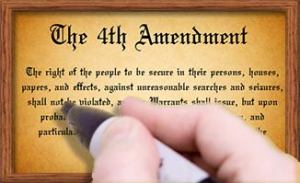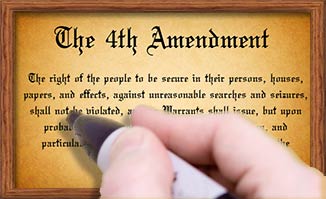Unpublished Decision Reverses Earlier Precedent
Courts lately seem to find ever more twisted logic to explain away constitutional protections against unreasonable searches and seizures – a right the constitution says “shall not be violated.”
 The United States Supreme Court took a broadaxe to the Fourth Amendment when it declared in United States v. Calandra, 414 US 338 (1974) that grand juries can ask questions based on illegally seized evidence. The phrase “shall not be violated” was lost on the Calandra court when it concluded:
The United States Supreme Court took a broadaxe to the Fourth Amendment when it declared in United States v. Calandra, 414 US 338 (1974) that grand juries can ask questions based on illegally seized evidence. The phrase “shall not be violated” was lost on the Calandra court when it concluded:
“The Fourth Amendment contains no provision expressly precluding the use of evidence obtained in violation of its commands.”
The court subsequently carved a massive tunnel through the Bill of Rights with what it called a “good-faith exception.” The exception undermined a rule the court had adopted decades earlier that excluded evidence seized during illegal searches.
At first, exceptions to the exclusionary rule were limited to evidence gathered after police officers’ factual mistakes – which could include mistakes about the validity of a search warrant.
In December, 2014, the court expanded good faith exceptions to include mistakes of law. In Heien vs. North Carolina (2014) the court authorized use of evidence collected during a traffic stop that was based on a non-existent law police nonetheless believed to be the law.
Good Faith Exceptions in Oklahoma
A few years ago, a United States Supreme Court case that expanded good faith exceptions to the exclusionary rule would have been of little concern for defendants in Oklahoma. Our state’s courts more carefully guarded constitutional protections against unreasonable searches and seizures.
That was until an unpublished 2010 Oklahoma Court of Criminal Appeals case — State v. Sittingdown 2010 OK CR22 — clouded decades of Oklahoma jurisprudence. Then, early in 2014, the Oklahoma court cited as precedent the unpublished landmark opinion rendered in Sittingdown.
“This Court recently adopted the good faith exception,” the appeals court concluded in State v. Marcum, 2014 OK CR1.
Oklahoma courts for several decades read the state constitution to provide stronger protections than the federal rights recognized by federal courts. Between the U.S. Supreme Court’s first creation of a good faith exception in 1984 and 2010 when the Oklahoma court reversed its own precedent, Oklahoma courts in at least 11 published cases declined to adopt the federal precedent.
States can generally afford residents better protection of rights in state matters than federal courts might afford in federal matters. And Oklahoma did. Until 2010. We formally found out four years later.
The Oklahoma Court of Criminal Appeals decision in Marcum was a perplexing reversal of at least 30 years of precedent. The same year the U.S. Supreme Court crafted the good faith exception in United States v. Leon, 468 U.S. 897 (1984), the Oklahoma Court of Criminal Appeals refused to join in. “We must decline to do so.” Beeler v. State 1984 OK CR 55.
The Oklahoma court had periodically reiterated its pro-privacy-rights stance. The court said in Solis-Avila v. State 1992 OK CR 27:
“This Court…has never adopted the United States v. Leon ‘good faith’ exception to search warrants such as in this case and we see no reason to do so at this time.”
The Oklahoma court more recently wrote in Dodson v. State 2006 OK CR 32:
“We will not apply the good-faith exception to save admission of evidence obtained pursuant to a search warrant which was not supported by probable cause. …[T]he application of the exclusionary rule to the facts of this case will ensure that police officers and magistrates and judges abide by the strictures of statutes relating to the issuance of search warrants”
Sittingdown Sets Aside Time-Honored Rights
The next year, seeds were sown for the stunning reversal of precedent. A police officer serving a Writ of Execution to seize cash from an indebted bar owner ordered him to empty his pockets. The officer found methamphetamine among the contents of the man’s pockets.
A district judge concluded the search warrant did not give police authority to search the man’s pockets. The state appealed.
The Oklahoma Court of Criminal Appeals overturned the district court’s finding that a demand for “everything” in the man’s pockets overstepped the authority of the writ. That would have been enough to settle the case.
Then, with no remaining reason to hand down a ruling on a good faith exception, the court all the same upended three decades of Oklahoma good faith precedent. Citing a case from 109 years earlier, (DeGraff v. State 1901 OK CR 82), the court said in Sittingdown:
“The Federal Constitution and the Oklahoma Constitution are the same in the rights protected and we find Leon is applicable here… The fruits of a search and seizure pursuant to a civil writ will not be suppressed even if the writ is subsequently found invalid if the officer acted in ‘objectively reasonable reliance’ upon the civil writ and abides by its terms.”
The Oklahoma court did not publish the change of direction until four years later in Marcum:
“This court recently adopted the good faith exception …”
Court Decisions Vanquish Right to Privacy
By embracing Leon in Sittingdown, the court not only marched well beyond the point necessary to settle the case. It extended Leon beyond the particular facts of the civil case to also include Oklahoma criminal cases. There are differences.
In a civil case, the person served with a writ has been notified of prior court proceedings. A person has an opportunity to adjust their behavior in view of the diminished privacy one might expect after an adverse civil court decision.
A criminal search warrant more often comes as a surprise. Especially if police mistakenly serve a warrant on the wrong address, or serve a warrant after it has expired, a person has a reasonable expectation that constitutional privacy protections are intact.
The expectation is reasonable unless “good faith exceptions” make any person subject to search and seizure any time a cop or court clerk makes a mistake. In essence, under Leon and now Sittingdown, citizens no longer have a reasonable expectation of privacy.
Police could mistakenly batter down your front door at any moment, and may be allowed to introduce any evidence their “mistake” discovers. That is “good faith” according to the United States Supreme Court and now the Oklahoma Court of Criminal Appeals.
Courts Allow Unbridled Police State
It needs to be said. If courts refuse to recognize protections afforded by our state and national constitutions, Congress and the state legislature need to codify those rights in statutory language.
Until then, police can rely on the pretext of good-faith mistakes to set aside basic constitutional rights. People who have never committed a crime, and who were never named in a warrant can nonetheless be hauled into jail and deprived of their property unless they can prove their innocence in an eventual criminal trial.
Consider the 2012 case when police served a search warrant on the wrong home in Mannford. Police seized cash, vehicles, guns and personal property from the disabled veteran and his wife who lived in the wrongly targeted house. Their evidence? Crumbs found in a typical sandwich baggie.
The crumbs – most likely food crumbs – tested negative for drugs but prosecutors delayed release of test results. The couple spent three days in jail, spent money on bail and more money on attorney fees.
The Wirth Law Office Bartlesville attorney eventually got charges dropped, but by then damage had been done. The mistaken drug raid, and mistakes about the content of sandwich bags – most likely fueled by overzealous enforcement in an environment of unbridled policing – cost the couple peace of mind they can never recover. The damage could only have reduced by timely recognition of the error and an immediate end to prosecution based on the error.
Or consider the case of a Texas car dealer pulled over by a cop who did not know the law about inspection stickers. Outside the front door of the dealership, the officer tackled and Tasered the 73-year-old businessman as he attempted to explain the law to the tough young cop. As a car dealer driving a car with dealer plates, he was apparently not required to have a particular inspection sticker.

(Watch on YouTube: youtu.be/BVNwPD7CPR8)
If police were trained to know they are accountable for their mistakes, they would have less incentive to resort to violence when citizens discuss the law with officers of the law. Instead, police are provided incentives to make mistakes in hopes that the can make a new case based on a hasty, ill-considered mistaken investigation.
Strategy Session: Tulsa Defense Lawyer
Read more:
Good Faith Exception Rewards Cops’ Ignorance
Court decisions that chip away at the constitutional rights make it more important than ever for those accused of crimes to retain effective defense lawyers. While courts may seem to have settled good faith exceptions, the fact that courts reversed precedent once could mean they would do so again. As of this writing, in December, 2014, Oklahoma courts have not formally adopted the latest good faith exception for police mistakes of law spelled out in Heien.
If courts systematically refuse to exclude ill-gotten evidence, it is even more important for defense lawyers to know in minute detail all other court rules. When prosecutors do not play by the rules, defense lawyers can seek justice.
In so far as Oklahoma courts do embrace federal precedent, prosecutors who attempt to introduce evidence on good faith exceptions must still show the court their proposed exception passes federal tests. Generally the test weighs how much excluding evidence would deter official misconduct against social benefits of allowing a criminal conviction based on otherwise illegal searches.
To schedule your initial strategy session about any criminal matter, police misconduct or illegal search and seizure, contact a Tulsa criminal defense attorney at Wirth Law Office. To begin your initial strategy consultation with the Tulsa lawyer, call (918) 879-1681 or send a question using the form at the top of this page.



